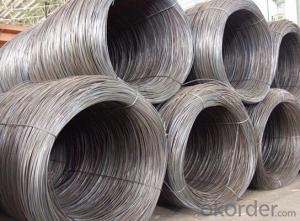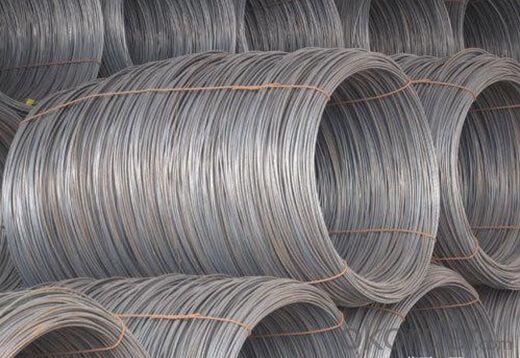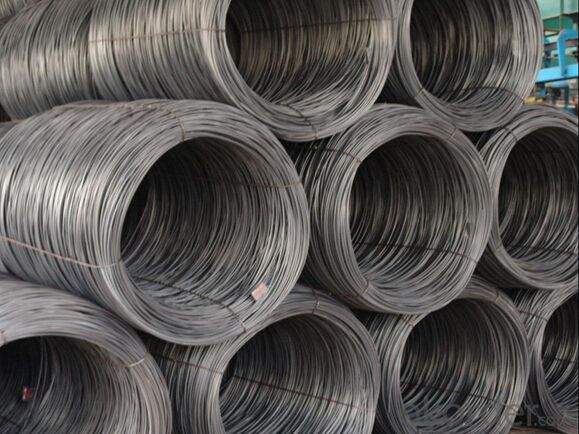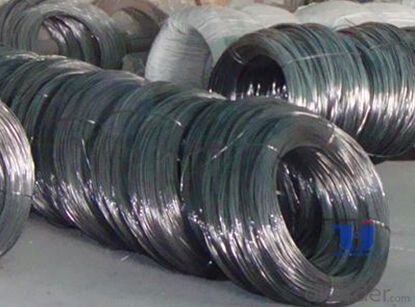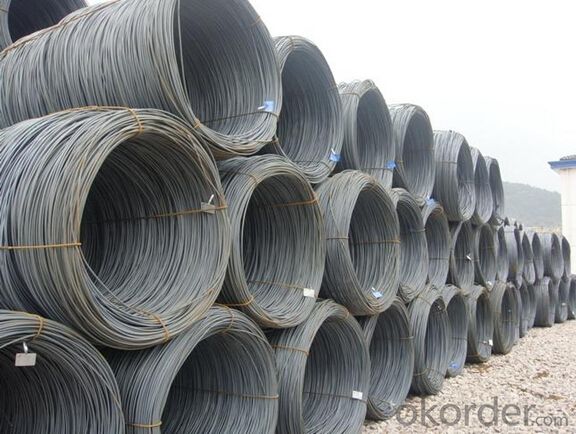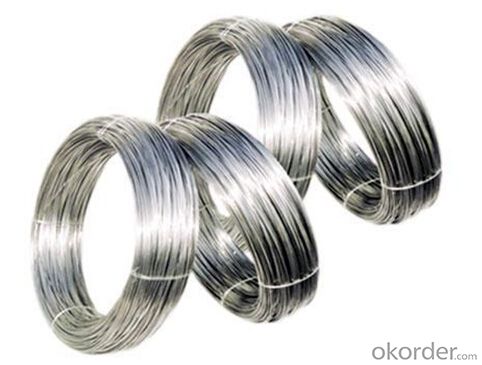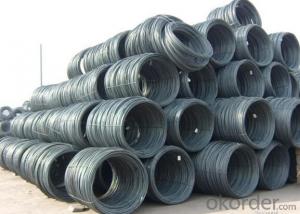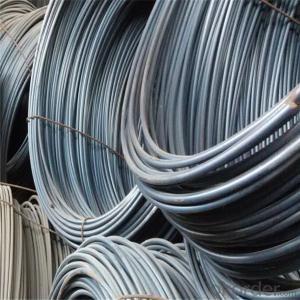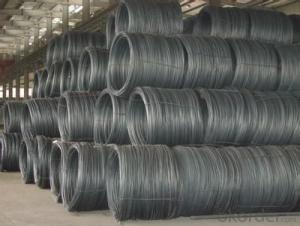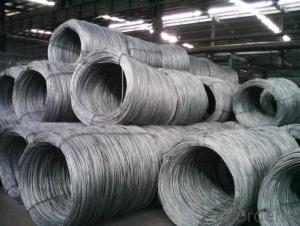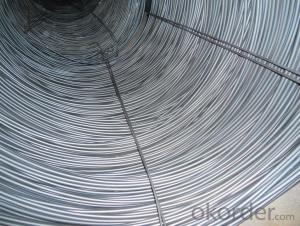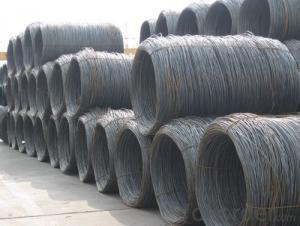Dia.5.5mm-6.5mm-8mm-10mm SAE1008-SAE1006-SAE1010 Wire Rod
- Loading Port:
- Tianjin
- Payment Terms:
- TT or LC
- Min Order Qty:
- 25 m.t.
- Supply Capability:
- 10000 m.t./month
OKorder Service Pledge
OKorder Financial Service
You Might Also Like
Specification
Dia.5.5mm-6.5mm-8mm-10mm SAE1008-SAE1006-SAE1010 Wire Rod
Specification
Packing: | With Bundles or Standard Seaworthy Packing |
Size: | Diameter 5.5mm--10mm |
Standard: | GB/ASTM/JIS/DIN |
Productivity: | 500 Ton/Month |
Unit Price/Payment: | T/T With 30% Advance Payment, The Balance Against |
HS Code: | 7214200000 |
Min. Order: | 1 Ton |
Composition: | Ferrous Steel Scrap |
Technique: | Cold Drawn |
Surface Treatment: | Plain |
Steel Grade: | Q195, Q215, Q235, SAE 1006, 1008,1010,1012,1016,1018, ect |
Application: | Structural Steel Bar |
Type: | Carbon Steel Bar |
Shape: | Round, Long |
Chemical Composition
Grade | Chemical Composition(%) | |||||
C | Mn | Si | S | P | Cr | |
SAE1006B | 0.03~O.07 | ≤0.32 | ≤0.30 | ≤0.045 | ≤0.040 | 0.3-0.35 |
Mechanical properties | ||||||
Yield strength(N/mm2) | Tensile strength(N/mm2) | Elongation(%) | ||||
250-280 | 350-380 | ≥32 | ||||
Grade | Chemical Composition(%) | |||||
C | Mn | Si | S | P | Cr | |
SAE1008B | 0.10max | 0.3~O.50 | 0.15max | 0.050max | 0.040 max | 0.3-0.35 |
Mechanical properties | ||||||
Yield strength(N/mm2) | Tensile strength(N/mm2) | Elongation(%) | ||||
≥195 | 315-430 | ≥30 | ||||
Company Information
CNBM International Corporation is the most import and export platform of CNBM group(China National Building Material Group Corporation) ,which is a state-owned enterprise, ranked in 270th of Fortune Global 500 in 2015.
With its advantages, CNBM International are mainly concentrate on Cement, Glass, Iron and Steel, Ceramics industries and devotes herself for supplying high quality series of refractories as well as technical consultancies and logistics solution.
After-sale service | CNBM provides the services and support you need for every step of our cooperation. We’re the business partners you can trust; you can relax and get on with doing business. |
For any problem, please kindly contact us at any your convenient time, we’ll reply you in our first priority within 24 hours | |
Advantages | Industry experience over 20 years. |
Shipment of goods -More than 70 countries worldwide. | |
The most convenient transport and prompt delivery. | |
Competitive price with best service. | |
High technical production line with top quality products. | |
High reputation based on best quality products. |
Products Show
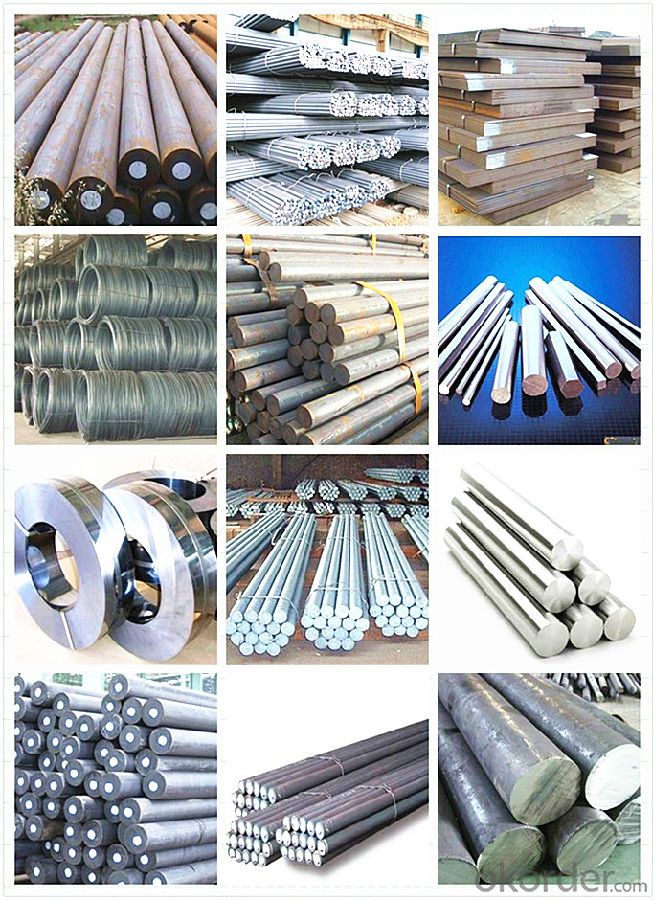
FAQ
Are you a trading company or manufacturer? | Manufacturer |
What’s the MOQ? | 3 metric ton |
What’s your delivery time? | 15-35 days after downpayment received |
Do you Accept OEM service? | Yes |
what’s your delivery terms? | FOB/CFR/CIF |
What's the Payment Terms? | 30% as deposit,70% before shipment by T/T |
Western Union acceptable for small amount. | |
L/C acceptable for large amount. | |
Scrow ,Paybal,Alipay are also ok | |
Why choose us? | Chose happens because of quality, then price, We can give you both. |
Additionally, we can also offer professional products inquiry, products knowledge train (for agents), smooth goods delivery, excellent customer solution proposals. | |
What's your available port of Shipment? | Main Port, China |
What’s your featured services? | Our service formula: good quality+ good price+ good service=customer's trust |
Where are your Market? | Covering more than 160 countries in the world |
- Q: What are the most common alloys used in special steel?
- The most common alloys used in special steel include stainless steel, tool steel, and high-speed steel.
- Q: What are the different cutting tools used for machining special steel?
- There are various cutting tools used for machining special steel, including carbide inserts, high-speed steel (HSS) tools, ceramic inserts, and diamond tools. These tools are designed to withstand the high temperatures and hardness of special steel, providing efficient cutting and shaping capabilities.
- Q: What are the different tool steel alloys?
- Some examples of tool steel alloys include A2, D2, O1, S7, H13, and M2.
- Q: What are the different corrosion protection techniques used for special steel?
- There are several corrosion protection techniques used for special steel, including: 1. Coating: Applying a protective layer of paint, powder coating, or other chemical coatings helps create a barrier between the steel and the corrosive elements in the environment. 2. Galvanization: Immersing the steel in molten zinc creates a protective coating that prevents corrosion by sacrificing itself to protect the steel underneath. 3. Cathodic protection: This technique involves connecting the steel to a sacrificial anode made of a more reactive metal, such as zinc or magnesium. The anode corrodes instead of the steel, providing protection. 4. Passivation: Treating the steel with chemicals or an oxidizing agent forms a thin, passive layer on the surface, which helps prevent further corrosion. 5. Alloying: Adding specific alloying elements, such as chromium or nickel, to the steel composition can enhance its corrosion resistance properties. 6. Barrier protection: Using barriers like plastic coatings or rubber linings can physically isolate the steel from the corrosive environment, preventing direct contact and corrosion. 7. VCI (Volatile Corrosion Inhibitor): Packaging the steel in a material that releases special compounds, such as VCI paper or film, can create a protective atmosphere around the steel, inhibiting corrosion. These techniques can be used individually or in combination to provide effective corrosion protection for special steel, depending on the specific requirements and the environment in which the steel is exposed.
- Q: How does special steel perform in low-temperature environments?
- Special steel, also known as low-temperature steel, is specifically designed to perform exceptionally well in low-temperature environments. One of the key features of special steel is its ability to maintain its strength and toughness even at extremely low temperatures. This is crucial in industries such as oil and gas, where equipment and structures are exposed to extreme cold conditions. When exposed to low temperatures, regular steel tends to become brittle and lose its mechanical properties, making it prone to cracking and failure. However, special steel is formulated with specific alloying elements, such as nickel, chromium, and molybdenum, which enhance its low-temperature performance. These alloying elements help to prevent the formation of brittle phases, which allows the steel to retain its toughness and ductility even at sub-zero temperatures. Special steel is extensively used in cryogenic applications, where temperatures can reach as low as -196 degrees Celsius (-320 degrees Fahrenheit). It is commonly employed in the construction of cryogenic storage tanks, liquefied natural gas (LNG) carriers, and other components that come into contact with extremely cold fluids or gases. In low-temperature environments, special steel not only maintains its mechanical properties but also exhibits excellent resistance to corrosion. This is vital, as low temperatures can exacerbate corrosion issues in many materials. The corrosion resistance of special steel is attributed to its high nickel content, which forms a protective oxide layer that prevents the steel from corroding, even in harsh conditions. Overall, special steel is specifically engineered to withstand the challenges posed by low-temperature environments. Its ability to retain strength, toughness, and corrosion resistance makes it an ideal choice for various industries operating in extreme cold conditions.
- Q: How is special steel used in the construction of buildings and bridges?
- Special steel is used in the construction of buildings and bridges primarily due to its high strength and durability. It is commonly used for structural elements like beams, columns, and trusses, as well as for reinforcement purposes. Special steel alloys have superior properties, such as increased resistance to corrosion, heat, and impact, making them ideal for withstanding the heavy loads and harsh environmental conditions that buildings and bridges encounter. Additionally, special steel can be fabricated into various shapes and sizes, allowing for flexibility in design and ensuring structural integrity.
- Q: How does special steel compare to stainless steel?
- Special steel and stainless steel differ in terms of their composition and properties. Special steel refers to a broad category of high-performance steels that possess unique characteristics, such as increased strength, toughness, heat resistance, or corrosion resistance. On the other hand, stainless steel is a specific type of steel alloy that is highly resistant to corrosion and staining. While special steel can exhibit superior mechanical properties, stainless steel excels in its resistance to rust and oxidation. Ultimately, the choice between the two depends on the specific application and the desired properties required.
- Q: Can special steel be used in the production of fasteners for high-stress applications?
- Yes, special steel can be used in the production of fasteners for high-stress applications. Special steel alloys like stainless steel or alloy steel offer enhanced strength, durability, and resistance to corrosion, making them suitable for demanding applications where fasteners are subjected to high loads or harsh environments. These special steel fasteners help ensure a secure and reliable connection, even under extreme stress conditions.
- Q: Can special steel be used for making oil and gas industry components?
- Yes, special steel can be used for making oil and gas industry components. Special steel alloys are often preferred in this industry due to their excellent strength, corrosion resistance, and high temperature properties. These components are subjected to harsh conditions and require materials that can withstand extreme pressures, temperatures, and corrosive environments. Special steel alloys, such as stainless steel or superalloys, are specifically designed to meet these demanding requirements, making them suitable for manufacturing oil and gas industry components.
- Q: What are the requirements for special steel used in marine applications?
- In order to ensure durability and performance in harsh marine environments, special steel used in marine applications must satisfy various specific criteria. These criteria encompass the following: 1. Corrosion resistance: To prevent degradation and maintain its structural integrity over time, special steel utilized in marine applications must possess a high resistance to corrosion, as it is exposed to saltwater in marine environments. 2. Strength and toughness: Steel employed in marine applications must exhibit adequate strength and toughness to withstand the dynamic forces and impacts encountered at sea. It must be capable of enduring heavy loads, extreme temperatures, and the impact of waves or collisions. 3. Weldability: Optimal weldability is a requirement for special steel used in marine applications, as it facilitates the construction and repair of marine structures. This characteristic ensures that the steel can be effortlessly joined without compromising its structural integrity. 4. Fatigue resistance: Special steel employed in marine applications must possess exceptional fatigue resistance to withstand the constant cyclic loading associated with wave motions, currents, and operational conditions. Failure to address this requirement can result in fatigue failure. 5. Low-temperature toughness: Due to the involvement of marine applications in cold climates or icy waters, special steel used in these scenarios must maintain its toughness and ductility even at low temperatures. This characteristic is pivotal in preventing brittle fracture and ensuring safety. 6. Fire resistance: High fire resistance is of utmost importance in marine applications. Therefore, special steel utilized in marine structures should possess a high level of fire resistance to prevent structural collapse and restrict the spread of fire. 7. Easy maintenance: Ongoing exposure to harsh environmental conditions necessitates that special steel used in marine applications be easy to maintain and repair. This ensures prolonged performance and minimizes downtime. To fulfill these requirements, special steel for marine applications frequently undergoes alloying with specific elements such as chromium, nickel, and molybdenum. This enhances corrosion resistance, strength, and toughness. Furthermore, advanced manufacturing processes and quality control measures are implemented to guarantee the highest standards of quality and performance in marine applications.
Send your message to us
Dia.5.5mm-6.5mm-8mm-10mm SAE1008-SAE1006-SAE1010 Wire Rod
- Loading Port:
- Tianjin
- Payment Terms:
- TT or LC
- Min Order Qty:
- 25 m.t.
- Supply Capability:
- 10000 m.t./month
OKorder Service Pledge
OKorder Financial Service
Similar products
Hot products
Hot Searches
Related keywords

